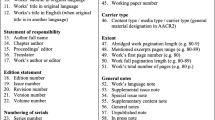Abstract
We investigate the accuracy of how author names are reported in bibliographic records excerpted from four prominent sources: WoS, Scopus, PubMed, and CrossRef. We take as a case study 44,549 publications stored in the internal database of Sapienza University of Rome, one of the largest universities in Europe. While our results indicate generally good accuracy for all bibliographic data sources considered, we highlight a number of issues that undermine the accuracy for certain classes of author names, including compound names and names with diacritics, which are common features to Italian and other Western languages.
Similar content being viewed by others
References
Abramo, G., D’Angelo, C. A., & Di Costa, F. (2011). National research assessment exercises: The effects of changing the rules of the game during the game. Scientometrics, 88(1), 229–238. https://doi.org/10.1007/s11192-011-0373-2. (cited by 5).
Aksnes, D. W. (2008). When different persons have an identical author name. How frequent are homonyms? Journal of the American Society for Information Science and Technology, 59(5), 838–841. https://doi.org/10.1002/asi.20788.
Bennett, D., & Williams, P. (2006). Name authority challenges for indexing and abstracting databases. Evidence Based Library and Information Practice, 1(1), 37–57. https://doi.org/10.18438/B81596.
Franceschini, F., & Maisano, D. (2017). Critical remarks on the Italian research assessment exercise VQR 2011–2014. Journal of Informetrics, 11(2), 337–357. https://doi.org/10.1016/j.joi.2017.02.005.
Garfield, E. (1981). What’s in a surname? Naturwissenschaften, 68(10), 519–520. https://doi.org/10.1007/BF00365376.
Harzing, A. W., & van der Wal, R. (2008). Google scholar as a new source for citation analysis. Ethics in Science and Environmental Politics, 8(1), 61–73.
Hood, W. W., & Wilson, C. S. (2003). Informetric studies using databases: Opportunities and challenges. Scientometrics, 58(3), 587–608. https://doi.org/10.1023/B:SCIE.0000006882.47115.c6.
Levenshtein, V. I. (1966). Binary codes capable of correcting deletions, insertions, and reversals. Soviet Physics Doklady, 10(8), 707–710.
Meho, L. I., & Yang, K. (2007). Impact of data sources on citation counts and rankings of lis faculty: Web of science versus scopus and google scholar. Journal of the American Society for Information Science and Technology, 58(13), 2105–2125. https://doi.org/10.1002/asi.20677.
Olensky, M. (2014). Testing an automated accuracy assessment method on bibliographic data. Journal of Library and Information Studies, 12(2), 19–38.
Olensky, M. (2015). Data accuracy in bibliometric data sources and its impact on citation matching. PhD thesis. http://edoc.hu-berlin.de/docviews/abstract.php?id=41398. Accessed 23 Oct 2018.
Pao, M. L. (1989). Importance of quality data for bibliometric research. In Proceedings of the 10th national online meeting on learned information, Medford, NJ (pp. 321–327).
Ruiz-Pérez, R., López-Cózar, E. D., & Jiménez-Contreras, E. (2002). Spanish personal name variations in national and international biomedical databases: Implications for information retrieval and bibliometric studies. Journal of the Medical Library Association, 90(4), 411–430.
Tunger, D., Haustein, S., Ruppert, L., Luca, G., & Unterhalt, S. (2010). The Delphic oracle: An analysis of potential error sources in bibliographic databases. In 11th International conference on science and technology indicators, Leiden, The Netherlands, 9 Sept 2010–11 Sept 2010. http://juser.fz-juelich.de/record/138630. Accessed 23 Oct 2018.
Acknowledgements
First of all, we wish to thank the anonymous reviewers for their useful suggestions. We are also indebted to Irene Bongioanni, Adriano Fazzone, Emanuele Fusco, and all members of Sapienza University of Rome who contributed to the analysis and cleaning of the bibliographic records stored in our local repository. Marco Schaerf was partially supported by H2020 Project Second Hands under grant Agreement No. 643950.
Author information
Authors and Affiliations
Corresponding author
Rights and permissions
About this article
Cite this article
Demetrescu, C., Ribichini, A. & Schaerf, M. Accuracy of author names in bibliographic data sources: an Italian case study. Scientometrics 117, 1777–1791 (2018). https://doi.org/10.1007/s11192-018-2945-x
Received:
Published:
Issue Date:
DOI: https://doi.org/10.1007/s11192-018-2945-x




